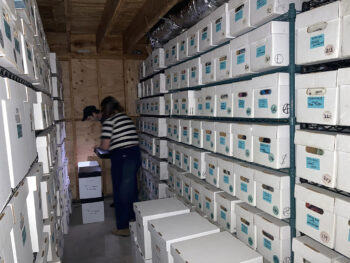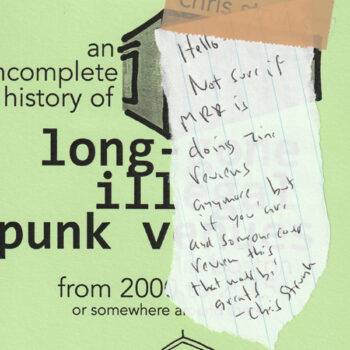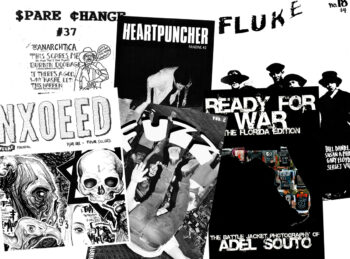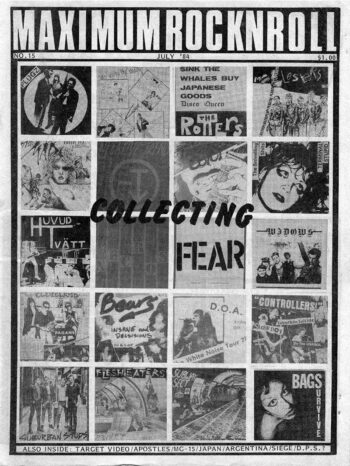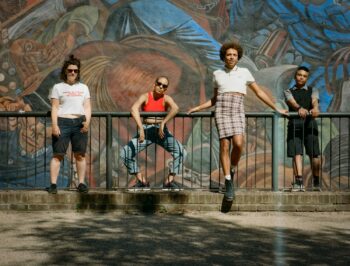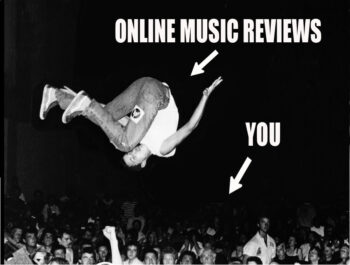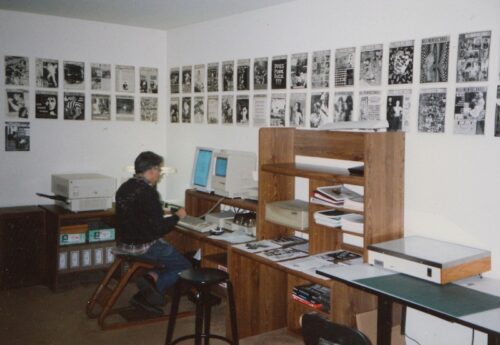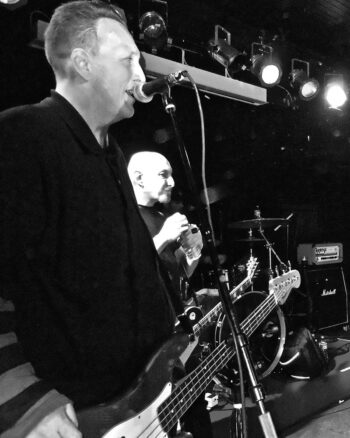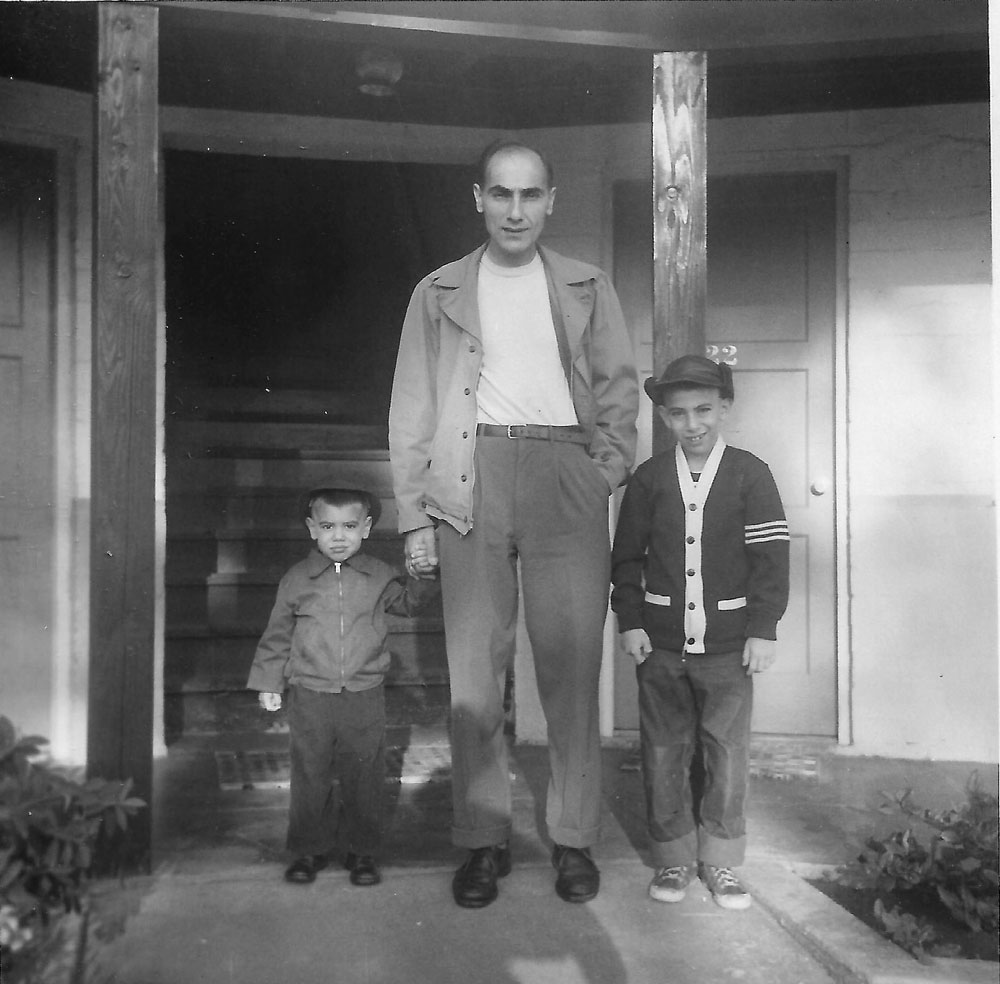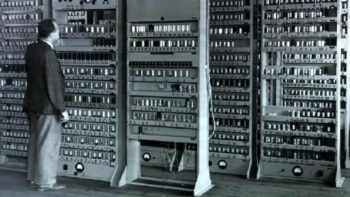Blast From the Past: Thrillhouse Records
This ran in MRR #297 which came out in February 2008, you can grab it here

At the very beginning, I’ll admit to having just the slightest amount of skepticism towards Thrillhouse Records’ survival prospects, especially when at their pre-opening day meeting it seemed like no one knew exactly how much to charge for sales tax. But time has proven the space to be an overwhelming success. The committed collection of punx involved with building and running Thrillhouse have managed to carve virtually from scratch a small but incredibly significant niche of thriving DIY punk culture into the landscape of San Francisco—no mean feat by any stardards. By the time this issue comes out, Thrillhouse Records will have celebrated their one-year anniversary. I sat down with nearly a dozen volunteers in November to talk with them about the store’s brief history.
Interview by Chris Hubbard
MRR: Let’s begin by talking about how the record store got started. Whose idea was it and how did you take it from an idea to a reality?
Fred: Starting a record store and show space was something I’d been talking about and wanting to do for quite a long time. For a long time we had Mission Records here, which was a really great place. I have really great memories from there. It closed down a few years ago, and all of a sudden the city didn’t have a punk rock record store or a good all-age show space. Both of these things are super important, and you really felt the hole that that Mission Records left. I assumed that some one would take it upon them selves to fill that hole and open up something similar, but years later still no one had. I daydreamed about dong it myself, but never really felt like it was very realistic. About a year and a half ago, I was going to school at the time, and I remember there was this one show I went to. It was a One Reason show and there was an intro to one song and they said something like: “What’s the point of going to school when you’re just going to do stuff like this? You’re just going to go to shows. What’s the point of spending thousand of dollars on school when you’re just going to do this? Learn from books or your friends.” I was like yeah! I’m spending thousands of dollars on school and this is stupid; I really just want to be doing stuff like this!
Garrett: One Reason started the record store!
Fred: Yeah, kind of. That’s when I really started talking about seriously doing it. I ended up dropping out of school the next semester with the intention putting my energy and time into opening up a Mission Records kind of place. I talked with a bunch of people about it and there was a crapload of people really into it, and a crapload of people that thought I was full of shit. But it really made a difference, the people that were really into it like Jesska, Zoe and Sarah T. We’d go on bike rides through niegborhoods we wanted to have the space in, just looking for “for rent” signs in the window. And that’s how we found this place.
Jessica: I remember talking to Fred about it. We had just met at the Kung Fu USA show. We met sharing the mic with Shell and afterwards we were like… “It was really nice rocking out with you. We should do that again sometime.” We hung out at a party a week later, and Fred was talking about wanting to start a record shop and I was talking about missing having a place to put on shows, and we talked about how cool it would be if we could put those two things together. Fred said, “I’m going to go ahead and drop out of school.” I was going to go on a trip with some friends a few months later and whenever I got back from that we were going to start looking for places. But Fred was looking while I was gone. And I’m from the Midwest and I love the basement situation and there aren’t any basements here. I got home and him and Sarah T. had been looking at places and we found this one and it was totally perfect. We moved in a few days later and started tearing up the floor and started building.

MRR: So was finding the place the first thing you did or did you try to save money, or look into the legal preparations or anything like that?
Fred: Yeah, after dropping out of school I got a full time job and started saving up a bunch of money. It was at a restaurant so I lived day to day off the tips and used my paychecks to just pay the rent and saved the rest for the store. I did that for about a year, saved up a lot of money, and blew it all real fast in opening up the store. I also spent my days off going online to look up all the legal crap you have to do for opening up a business. I went to the small business association of San Francisco and met with this dude would gave me all this paperwork I would have to fill out and just kind of laid out all the steps I needed to take. That’s really all the preparation I had before finding the spot.
MRR: Was there anything specific you needed to have when you signed the lease or did you have to take out any loans, and what’s the agreement with the landlord?
Fred: The lease agreement we had was kind of a special one. We got this place and it was fucking trashed. I met with the landlord and he was like, “This is how much I’m looking to rent for, do you want it…” He was pretty straightforward it was just like renting a house. I was like, “Alright man. But before you do that you’re going to need to fix the plumbing and the electricity, and there’s all this mold everywhere and all this should be taken care of.” He said, “No I’m renting the place as is. You can do whatever you want to but you have to take care of fixing the place up.” I was like alright, but I want it written in the lease that we can do whatever we want to the place. He also gave us one month’s worth of free rent so we could fix up the place.
MRR: Why don’t you say exactly what you did, because most people reading this have never seen the place. So why don’t you describe the set up here and what you built.
Fred: The place was originally one big open room with vaulted ceilings, about 20ft tall. Our idea for the place was to make a record store in front, house in back, show space in the basement. We’d have enough people living here so that we could fund the entire rent for the building through the kids that lived here. Therefore the record store and show space could operate for free, but to do that we were going to need to do a ton of construction work. The plan we drafted was to leave the front area as it was but in the back build a second floor were people could have rooms and live up there. That required building a staircase, support beams, making a floor strong enough to support heavy weight, wiring electricity, and kinds of other stuff I’d never done before.
Will: I remember walking in the room the first time and it was an empty room. And now all this surrounding us is kind of remarkable. I was amazed when I saw walls going up so fast. And it looks really cool and I can’t picture it any other way.
Fred: Jean-Paul built our house.
Jesska: I remember when we first moved in it was just like this giant room and we started tearing up the floor and it was when I realized I was good at manual labor. This whole floor area was really moldy carpet and under the carpet was all this broken tile. Then hardwood floors under all that. We hauled the carpeting and tiles all out of here and took it to the dump and it was two tons worth of crap. We all asked for job application while we were there and then lost them somehow on the way home.
Nick: I remember when we were first starting working here and everybody was leaving every night with Safeway bags full of rubble, scraps, and dumping it in trashcans and dumpsters on the way to bus stops or BART or wherever they were headed.
Jesska: We couldn’t afford a dumpster of our own so we would sneak out these little bags of broken tiling and walk them down the street and leave them next to somebody’s garbage can.
Fred: We got rid of a couple hundred pounds of garabage through those little bags of trash. Probably saved us a bunch of money. When you go to the dump, they weigh your truck before you go in and then again after you leave and charge you for how many pounds of crap you left there.
Garrett: It’s almost like if that second story wasn’t built, I don’t know how this place would be open really because the store isn’t for profit and the shows are pretty much free, unless we’re asking for donations for a touring band. Nobody works for money here. If there wasn’t that actual space for a couple extra fucking human beings to live in to pay rent on the place and work a day job… the money’s not really going to come from anywhere else. How many people that helped build that, and the fact that it even exists is a huge deal. Just those boards right there…
Mason: If you’re up there now it’s pretty sturdy.
Jesska: I forgot to be afraid.
Garrett: There was that earthquake a couple weeks ago and it 5.4 in San Jose and it still sounded scary as shit.
Jesska: You could hear everything creaking and kind of moving upstairs it was not a safe feeling.
Garrett: Don’t let the Fire Department or anyone read this interview.
MRR: I’ll put that on the cover. Do not sell to…
Jesska: A kind of parental advisory.
Nick: We were really really reliant on people’s skills and expertise like Jean-Paul with the plumbing electrical work and people who had carpentry experience and things like that.
MRR: So how many people live here exactly?
A chorus of: 7.

MRR: How do you separate the store and the private areas?
Garrett: Interesting question.
Jesska: Weren’t we going to have a house meeting about that?
Garrett: We should actually not record this and talk about this.
Jesska: Sometimes we don’t get to and it kind of sucks. We go through periods of really wishing there was more peace and we go through periods of being stoked that everyone’s around all the time.
Garrett: It’s definitely a very weird thing because having never been around other record stores or even collective houses sometimes as an outsider you may feel like people are being elitist or exclusive. But after living here its definitely called into question where the lines are drawn. It’s a house but it’s also meant to be so much more. On the one hand you know what you’re getting into when you move in, and you know what living in this situation is going to be like, on the other hand you get a lot of people that might come through and be around that you don’t really know what their intents are. You do your best to be open… The place is open for everybody definitely… like a couple weeks ago we had to throw out this guy. He was at a show just doing really inapropriate things. And where do you draw the line between having it be open for everybody yet at the same time there are rules. I feel like its a little more organic. We don’t really have that many meetings or set up a charter but there are just sort of inherently agreed upon rules that you kind of follow.
Fred: Just at this last show there was somebody drawing on the walls, leaving their tag. I was like, “come on man, this is our living room… don’t draw on our walls.” He was like, “Oh, sorry I forgot you guys actually live here. This is actually your living room.” Then apologized and took off. Not like it really mattered all that much, but it just sucks sometimes to live in a place that strangers come in and treat like their own personal funhouse. I guess I’m totally asking for it in a way, but it also bums me out when I’ll go into the bathroom and see that some one has drawn a picture on our bathroom mirror with my toothpaste. Fuck man, I brush my teeth with that.
Michelle: You had to remind your friends not to pee in the bath tub.
Will: I don’t live here but it seems like a lot of times at shows some people get drunk and there just kind of like, “Oh I’m at a show it’s punk rock.” It’s like no dude, it’s this guys kitchen. Quit fuckin around… “don’t set that on fire please.”
MRR: So there’s sort of like an understanding with the people who live here and pay rent here that they’re basically supporting the record store, is that right? So the record store is there but it doesn’t pay for the space. Is that how it works?
Fred: Yeah basically. None of the money that the record store makes goes into paying the rent or the bills or anything. The people living here pay for that with their rent. Any money that comes in goes to buying more records or sometimes supplies to improve the space. Same goes for the label and show space; any money the label makes goes to putting out more records and we always give 100% of any money collected from a show to the bands.
MRR: How do you guys organize everything and how are decisions made between everybody and is the store run collectively or is there one or two people who make the decisions or have the final say? How does that work?
Jesska: The store or the space?
MRR: I don’t know, I guess both. But mostly the store and I would imagine they’re kind of related but why don’t you talk about the store first?
Garrett: I don’t know. They’re both kind of connected. It’s definitely connected. That’s what I always thought was one of the raddest things about it. It was definitely cool a few months ago we actually decided to have semi formal meetings. Up to that point things happened pretty casually. We’re all pretty tight knit here. It was cool to have something that was collective but not…
Jesska: Forced.
Garrett: Yeah. Exactly. Things weren’t forced and we could all have conversations together. As long as everything functions the way that it is and people just step up on their own, people are like, “I’ll work this day at this show,” or “I’ll stay here and clean up,” or people show up and help us out with the sound. It’s really an organic thing where people just sort of do it. I don’t know if you can exist like that for years on end… it’s approaching the first year and so far its been on everyone’s own and people just volunteering and doing things on their own and thats what I think is the coolest thing about it. Because, like you said, there is no Mission Records anymore. In the city people can’t really do this shit at their house all the time… have shows. It’s not really like Oakland or the East Bay where it’s a little more open ended. There’s an inherent need I guess.
Morgan: And it seems like the majority of the people who hang out or have been involved are generally like-minded as far as what they want, and contribute to the sustainability of the space being around. It’s definitely less dynamic than some collective. Not as formal, but the majority of people contribute in their own way, with shows they’re willing to step up to keep shit in order and help out with how everything is going and generally being respectable and keeping everyone comfortable.
Fred: We don’t really have any assigned roles for the jobs that need to be done, like “after show clean up crew leader”. There isn’t really anybody in charge of this or that. When the need for something presents itself, someone will recognize the need and just step in and do it.
Garrett: That first all volunteer meeting we had with Tosh and some of his friends, a lot of us hadn’t really talked to them and these people just showed up and said, hey we know how to do electrical work, we can ground the electricity in the basement.
Will: There was a problem with being shocked downstairs. So we fixed that.
Garrett: We didn’t have to form a committee about it. You know, let’s have an unshocking people committee. Somebody just showed up and just helped out.
Mason: And if you have an idea you just tell people about it and they’re like… oh that’s cool.
Jesska: Everybody has a different focus and there’s something that’s more important to different people and everybody does just jump in and get that thing done that they really care about and it all comes together to make things work out and its amazing.

MRR: You mentioned people having some carpentry and electrical experience, has anybody had any experience running a business or running a record store.
Jesska: I felt comfortable wanting to help start a store and everything with Fred because I’m from Tulsa and Morgan moved to Tulsa and started a record shop there.
Morgan: Growing up here I worked in Epicenter and Mission Records and moved to Tulsa and it’s kind of almost freaky how exactly similar to the situation with everyone getting this place and getting the place in Tulsa as far as the set up, development, the fucked up deal with the landlord. It was virtually the same idea, showspace, lived in the back, record store in front.
MRR: Would you consider the record store to be a success so far or is it doing as well as you expected or worse or better?
Mason: When Fred told me how much we made from records I was like oh… we probably make 600 a month and I was blown away how much we made.
Fred: We don’t make all that much, we defiantly couldn’t be open if it wasn’t for the people living here. But people come in a buy something everyday and its usually something they couldn’t find anywhere else. We don’t have a really big selection but the records we have are all underground diy records for the most part. Stuff that other record stores just don’t carry. Either its off their radar or they just think its trash. But we have a place that people can come in and buy awesome records that would otherwise be unavailable to them. That’s a cool thing.
Noel: Not only that but I think that it’s a huge success. I know we talk about how we want to make a tighter bond with everyone. I’ve talked to people about how they want stronger community, like not just seeing each other at shows, and like not knowing much about each other but like hanging out during the day and coming together to build a record store. It’s done a lot for friendships.
Morgan: A place like this is always kind of needed. We needed a space like this largely due the fact that there really aren’t any central, all ages spaces. It’s a big city and there’s a lot of people involved in the scene but we’re still very community based despite being around this plethora of shit. There’s no central all ages spaces, there’s no meeting points. It’s always kind of needed, like an epicenter or a mission records. A spot where everyone can convene, if nothing else, besides getting together and having an awesome space to hang out and got to shows like play music… put on cool events or art shows or anything else. It’s always been necessary and I think it’s entirely successful in that regard. Like before Thrillhouse was open things were awesome, but there seemed to be a definite lack of cohesion.
MRR: So besides having the record store and having the shows that you have can you give me an example of what else has happened here… like an art show or a performance or something?
Garrett: There’s always art shows. Every two months….
Michelle: We’ve got the silkscreen set up in the basement.
Garrett: That’s new, yeah that’s awesome! That was another thing that was… that’s somebody that just came by that lived in the community and brought over his screen printing set-up over and is letting anybody use that wants to. He’s also setting up an open workshop for anybody that doesn’t have any experience that wants to learn from him.
Jesska: We all get together and we watch Kid Nation.
Fred: We released a couple of records.
Garrett: Yeah there’s also the label.
Noel: There is the sex corner.
Fred: Safe sex corner.
Noel: Safe sex corner.
(Laughs)
Fred: It’s a place in the corner of our store, next to the couch, that Noel and Naomi set up with all this information about safe sex and free materials you might need.
Morgan: Will just started giving drum lessons to homies in the basement.
Will: So if anybody wants drum lessons…
Michelle: Write into MRR.
MRR: So why don’t we talk about some of the problems that you’ve encountered and how you’ve dealt with those…
Garrett: Trivial shit, like right now it’s a small deal but there is… with volunteers… there’s a lot of people that were really enthusiastic in the beginning and were helping out. It is a really a big deal to just volunteer and help out and watch the store, and you know, there’s two four hour shifts a day. A lot of people show up and business isn’t exactly that crazy. Sometimes you’ll sit here for four hours and nobody will show up. But even just watching the store and filing a record or two and sweeping the cigarettes butts off the front. To us that’s a big deal. A lot of people will show up so enthusiastic and come in here for four hours once a week, two times, and be like, fuck this, I don’t want to sit here all day. That’s understandable, but I think if people realize how important that was.
Fred: It’s hard to keep volunteers cause we aren’t paying anyone, and watching the store can be boring some times. A lot of people will volunteer and we’ll rely on them but after 2 shifts they’ll just stop showing up. I’ll be coming home from work at 6pm and see the store has been closed all day. Then I’ll call the person up and ask them about it and they’ll say something like “well last week I showed up for 4 hours and just sat there and only sold one records and I just thought to myself what’s the point of even showing up.” And that sucks.
Garrett: Also, it hasn’t happened that often… we haven’t had too many problems but it’s definitely something we’d always talk about amongst ourselves as far as shows. You get a lot of people that maybe aren’t really understanding what we’re trying to do here maybe or maybe just had too much to drink. Like, that guy who came out while Wildlife was playing a couple weeks ago.
Will: That guys was like, all up in our face before we start playing and this guy, he had been harassing people…
Garrett: …all night.
Will: And our guitar player just ended up making a shit load of noise and just yelling into the mic like… You need to go! You need to leave!’
Garrett: And he’d been touching people that really didn’t want to be touched.
Will: And like grab a girl…
Garrett: It’s really fucked up.
Garrett: And we had to throw this person out. And this was…
Will: A big dude.
Garrett: A very fucking large man and it was like myself and Fred, and Jackson from Love Songs…
Fred: And Shawn from Abi Yoyos. But yeah he grabbed this one girl in a way she didn’t like so I took him and lead him out front and told him he had to go. And there we were, 4 of us in front of the house, me and Garrett, Jackson wearing a pink shirt with the sleeves cut off and Shawn with beaded handkerchief necklace and feather earring in one ear. And we’re telling him to leave and he starts getting all angry.
Garrett: And we’re standing out front being like.. you gotta go… and we’re not trying to be the cops here but you’re in our house, or you’re in our space and this is really fucking inappropriate… And you gotta go. And it’s kind of like what do you do? Cause the last fucking thing we’re going to do is like hire security guards or something like that… It’s like we’re all going to take care of our own. And it was funny that night because a lot of people that were walking in past us and we all did our thing but I was like really scared. This guy would’ve beatin the shit out of all four of us. He would’ve killed us. And there were friends of ours that were walking by, and I’m not going to name names but, friends of ours that are much larger and much more intimidating individuals than the four of us. They were walking by and they were just like… hey what’s up Garrett and they just walked by inside. I was like… c’mon man. That’s not really a problem, we haven’t had too many problems with that but it’s definitely, it’s just typical shit that you’d expect. Anytime you leave anything open for anyone to come by you can have people that are not really down with you’re doing. They’re not necessarily bad people, but…
Naomi: We had to kind of put a… not a rule, but just a limit to how much people can be violent in the space and I think we dealt with it well. We talked about it at our first meeting. We acknowledged that it happens and just put a limit to how many people can offend and what they have to do get back in people’s good graces.
Fred: If you act violent in our place twice and we don’t want you back. Everyone has a bad night where they wish they didn’t do something they did. One fuck up, you know.
Garrett: And that goes back to earlier about not necessarily having a fucking charter.. or rules but just like.. things are going to happen and its good to all be on the same page. We just kind of feel it out as events unfold and just deal with it in our way. It’s been good so far.
Noel: The same thing with the volunteers, like a month ago or whatever it was. There was a dire need for volunteers and Fred was saying… I don’t know what we’re going to do… we need a lot of people to help, there were days the store would be closed when I walk by, and within a week of putting the word out we got every shifted covered. It was really great to see people stepping up, like people really care about this space.
Will: The preservation of the space is priority one to everyone involved.
Garrett: In reality there should be like 40 people here in this interview, theres so much more than work that people contribute everyday.
Morgan: It’s kind of amazing considering the fact that it is a non-exclusive place that has shows and anything that’s open to anyone, the fact that there hasn’t been that many drastic, big problems is kind of amazing. There’s a lot that could happen.
Garrett: That’s kind of like what you mentioned to me once about what happened to you in Tulsa… when you had that record store. Often times its better to talk to someone about it and work it out while they’re there. If you just throw somebody out then they’re outside and they’re mad and that’s almost worse. Because they’re outside of your house and drunk and angry.
Morgan: Shit just kind of works out pretty good. Everyone who comes around… there’s some kind of level of working things out with them.
MRR: As far as the record store goes has there been any problem with theft or with destruction of property?
Fred: We take out the LPs and CDs out of the cases and have them behind the store so if people try to steal something they only get an empty case. Kind of modeled after Extreme Noise in Minneapolis.
Michelle: One time someone tried to steal…
Mason: His name was (Scotter Leva?) You’re scum, put that in the interview
Garrett: I’m done being passive aggressive with that guy, I’m lettin’ you know.
Michelle: We grabbed him by his collar and marched him out the door… It was awesome.
Fred: That was when we had a show in the actual store part of the record store.
Mason: The funniest part was that he stole a CD and he didn’t know that the CDs aren’t even in the CD cases here.
Garrett: Actually he didn’t steal the CD, his friend stole the CD. And Fred heard him talking about it. He was like “I stole this Exploding Hearts CD” and the CDs are all empty, they’re all empty cases… and he was like “sweet get me one too.” And that was the best part because it was like this fuckin idiot just tried to steal and empty CD case. Get the fuck out of here.
Naomi: He didn’t know that the person who pretty much runs it, Fred, was standing right next to him.
Fred: Yeah I overhead him bragging about stealing the CD and asked him about it and he tried ignoring me, but I just kept saying “Look man I heard what you said but if you look in your bag you’ll find it’s just a CD case, no CD, so you might as well just give it back. Eventually he saw that I wasn’t going to give up so he gave it back to me and we kicked him out.
Noel: Wasn’t there also a case where there were CD cases found on the street?
Fred: Somebody came in one day and was like, “Are these yours…” and they’re like “I found these empty CD cases sitting on the street.” So somebody had apparently tried to steal a Minor Threat and Kid Dynamite CD.
Jesska: I thought they tried to steal like an MU330 live CD or something
Fred: I’d let them steal that.
Morgan: The silliest part is you can’t find those records cheaper anywhere else.
Garrett: The point is don’t not steal from us because it’s fucked up, don’t not steal from us because you’re going to get an empty CD case and just put it on the corner on 30th and Mission anyways.
Fred: I keep up the inventory so I notice when stuff is missing and we don’t really have that big of a problem. Every once in a while there will be a really awesome 7″ that comes through and then I’ll look for it later and not find it. Then look in the books and see that it hasn’t sold, and be like, ah man… somebody fuckin stole that Hickey 7″. Bummer. But thats only happened a handful of times out of the whole year, and I suppose most places probably deal with stuff like that everyday on Mission Street.
MRR: There’s just a couple more things I wanted to go over. Just a little bit more about the show space, maybe you can talk about how that’s organized and who books the shows and how do you decide who plays and how that works?
Fred: I kind of oversee the booking but, most of the shows are booked by people other than me. We have about one show a week here. What will usually happen is somebody will come up to me and ask if we can put on a show for an out of town band they know that’s coming through on tour. If we have space on the calender for that show I’ll say yeah and then put them in charge of finding a few local bands to play the show too. All kinds of people book shows here and we rarely book a show around a local band. Its all about helping out friends who are on the road, or kids that helped us out with shows while we were on the road and trying to put together an awesome show for them with our bands.
Garrett: It seems like it’s one of those areas we were talking about earlier where it kind of becomes like a gray area between being like an actual show space and a house. If you ever go out of town there are places that are a house that puts on shows and it sucks because you get a lot of shit from people sometimes because they assume it’s like a show space like a bar. You know like they are gonna just book a show. And maybe people are gonna get upset but it’s like you can only do four shows a month and I’m trying to not make this sound like the shittiest place possible. It’s like there’s literally like 12 bands a month that can play here, but it’s still a store and we live at the store and we do shows in the basement. We do as many shows as we can but it’s usually you know help people out of town I guess.
Mason: Mostly just friends of friends. “Oh this friend of mine is coming through, can they play here”. Then you book a show for them.
Garrett: It usually works out like that, a local band will help out and people will show up for the local band or whatever and then people will see the band from out of town.
Will: Most of us are in bands so we all get contacts from people who we’ve met on tour or whatever or people who are coming through. Whatever resources will make a bill.
Naomi: I just think that my favorite part is that booking a show means writing it in the mini astrological show calendar.
Jesska: It’s my calendar that Heather gave me for my birthday. Its this really small calendar that we write all our shows on
Andy: It’s really funny, the other day me and Michelle were working and looking through all the shows we did in the past year and looking at like all the writing on the calendar. Like oh yeah I remember that show
Garrett: Everyone’s birthday. The random people that turn their back at the store wrote their birthday on the calendar. So you’ll see it’s so and so’s birthday and next to it someone will have written “sucks shit.”
Michelle: According to the calendar how’s playing the 31st?
Fred: I was in my room the other day and somebody was flipping through the calendar and someone was like, Holy shit The Melvins are playing?’ Because I wrote like Melvins and Earth Wind and Fire are playing on New Years.
MRR: Have you pretty much had like one show a week since you started doing shows?
Fred: Yeah, sometimes a few more but like one every week.
MRR: So somebody mentioned touring bands getting money. How does the money work, do you collect money at the door? Does the money go to the house or the bands? How does that work?
Fred: Yeah, we always try to collect donations for touring bands but we never demand it. We have somebody at the door who says, hey man you have money for the touring band?’ But something I learned really early on is you have to be a little more aggressive about it other wise you’ll end up with $17 is change for a band on tour from Japan and the place will be packed. When I’ve had to work at the door I’ll make eye contact and ask if they have money for touring bands? And if they are like ah no, I don’t,’ then I’ll have them ask their friend to borrow a few dollars or ask for a few beers out of that 12 pack your walking in with. I’ll usually ask for money first but if they don’t have it I’ll say “well in that case let me just take a lock of your hair, or a sleeve off your shirt.” I’ve taken scissors with me when we’ve had bands from out of the country play and I’ve seriously taken chunks of hair from people. Mika gave a lock of her hair to get in because she was like, “I honestly don’t have any money!”
Michelle: Whoa!
Nick: I counted the money that night and her lock of hair fell out and flew behind my bed. I forgot about it and it remained in my room for months.
Fred: We take that money and give 100% of it to the touring bands and then we break it up evenly between them and then we’ve never taken money for the house. We recycle the cans and we buy toilet paper with that. We give out 100%.
Naomi: Unless it was a benefit show.
Fred: We’ve got a lot of money for bands like we paid The Vicious $600 when they played here. Out of donations.
Michelle: $600? Holy shit.
Jesska: At that Ergs show we made like $400 or something?
Fred: Off with their heads got a couple hundred bucks.
MRR: Alright, so the last thing I want to just go over with is the record label and maybe you can talk about how connected that is to the record store and how you organize that and how you decide who puts out what and how you finance it?
Fred: That’s just kind of my project. I do most the decisions and most the work, but I’ve totally had a lot of help from a lot of people. I put my own money into it and as they sell I have money coming in for new projects. So far it’s pretty much been like half and half of putting out new stuff from local bands I really like and reissuing old local stuff that I really love that’s been out of print for a long time. I’ve done a couple of SPAM records reissues and I’m going to be reissuing a few LPs that Onion Flavored Records put out like the first Sexy and first Modern Machines LPs. Also have some new stuff coming out really soon like the Onion Flavored Rings 7″ and Shotwell LP.
Garrett: I thought you took prominent East Bay figures and forced them to help you. I read East Bay Express and you didn’t even start this record store.
MRR: Alright so I guess I’d like to close up. I wanted to see if you had any advice for anyone considering doing something similar in their local.
Jesska: I would say that really it’s just a matter of wanting to do it. Like just taking the steps little by little. Figuring out solutions for problems as they come up. And the most important thing to remember is that even if your show space and store lasts like two weeks, that one show that happens at that space is like the best show that anyone has been to in like a really long time. So you might as well do it.
Fred: And it’s actually a lot easier than you think to put together. As long as you are really serious in wanting to do it, it all comes together. Like, you don’t need to know anything or have any experience.
Morgan: I was gonna say also, especially other places in the country you don’t have to deal with as fucked up rent prices. I don’t know how much you had to pay for a business license but we were freaking out about that. Then we went and found out a legit business license was only like 18 bucks and that’s it, now you have a legit business. And if you are within a community that gives a fuck about getting a space like that it’s not hard to get people involved.
Will: Pretty much all you need is the will to do it.
Fred: Pun intended
Will: Shit! No but seriously, like everybody in this room has really busted their ass to make things happen. It’s like everybody’s collective efforts. It is so cool to be part of. I only moved here a year ago and this is like basically my whole life in SF.
Naomi: It was like a good sign that a whole group of people came to do this interview. It’s not just three people that sit in a room and plan this whole thing out. It’s obviously a community of people who live here and don’t and have bands and don’t. It’s just everybody. There’s like 15 people here right now.
Garrett: We all just want to be in MRR.
MRR: I guess that’s a good place to end.
(Thrillhouse still exists! and they just remodeled! Go and visit them next time you are in SF)

